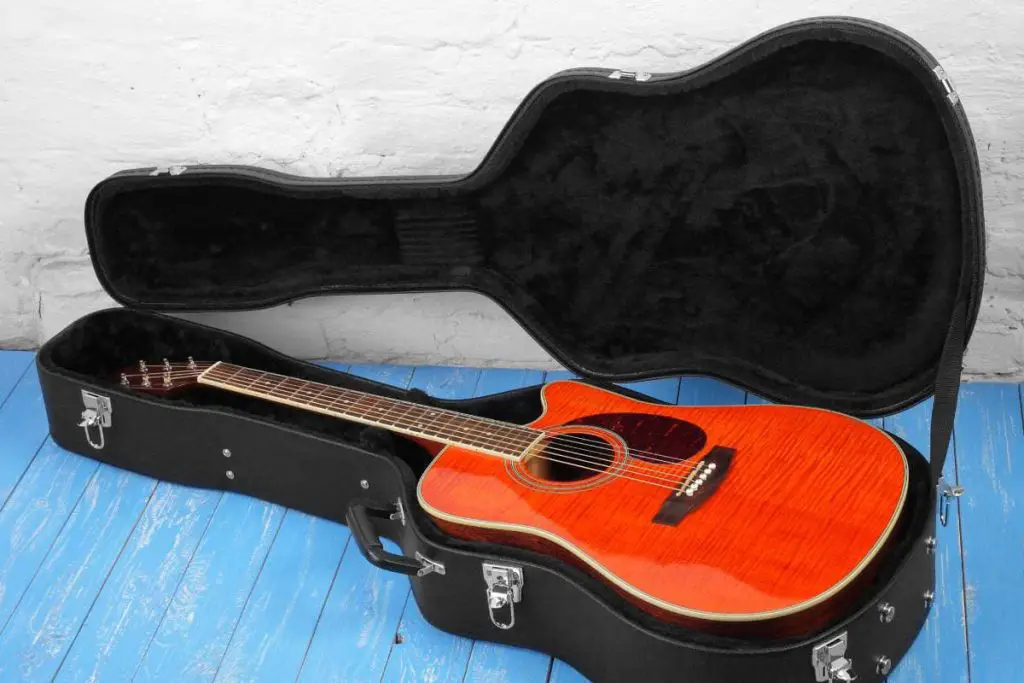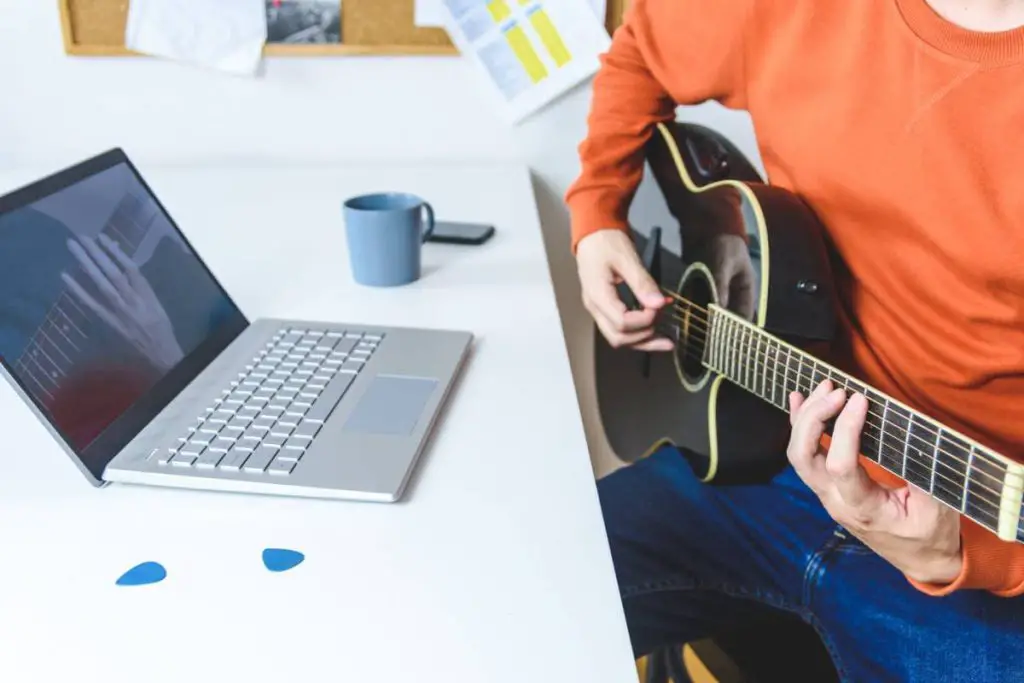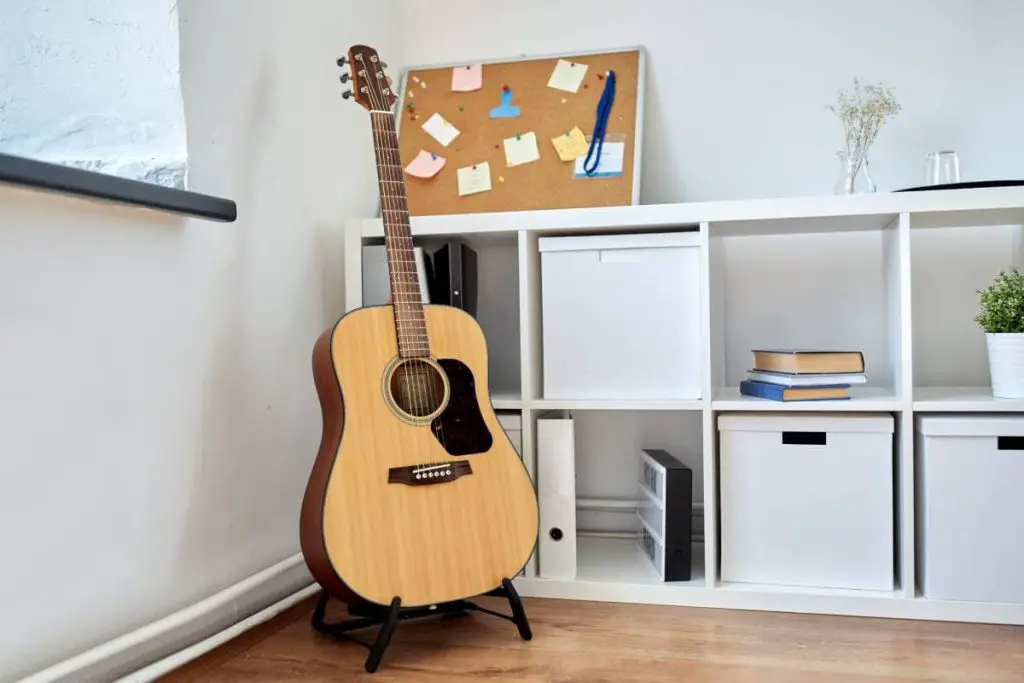Moving in with your guitar can be rather stressful, especially when you’re starting college and have to figure out how to store and play your guitar without bothering anyone. It’s essential to know how to handle this issue so you can keep practicing without torturing your roommate and without risking of damage to your guitar.
Here are some useful tips for keeping a guitar in a dorm room:
- Check if guitars are allowed.
- Get a guitar case.
- Lock your room.
- Get insurance.
- Don’t bring your favorite guitar.
- Use headphones.
- Use a laptop.
- Silence your acoustic guitar.
- Put your guitar on a stand.
- Keep your gear in the closet.
Read on to learn more about how to successfully keep playing your guitar while in college. In this article, I’ll show you what you need to do if you want to follow your musical ambitions while living in a dorm room.
If you want to find out what my recommended guitar gear is, then here is what I recommend on Amazon:
- Fender Cutaway Acoustic-Electric Guitar Bundle (MY FAVORITE GUITAR)
- Snark SN-8 Super Tight All Instrument Tuner (Easiest Tuner I’ve Used)
- 6 String Acoustic Guitar Capo (Best CAPO for quick changes)
- Dunlop Max Grip 1.0mm Nylon Picks (Thick Guitar Pick So You Don’t Lose Grip!)
- Universal Guitar Stand (Cheap & Minimalist Guitar Stand I Recommend)
- Levy’s 2″ Wide Quick Adjust Guitar Strap (Best Guitar Strap For Any Level)

1. Check if Guitars Are Allowed
Before you create a strategy for dominating the music scene from your dorm room, you first have to check if it is even allowed to have a guitar there.
Most dorms won’t outright ban musical instruments, so you probably don’t have to worry about that. However, some dorms have specific times during which you’re allowed to make some noise, so you’ll need to check when that is.
You’ll also want to sniff out if there’s a suitable room where you can practice without disturbing anyone. If you’re lucky, there might even be a dedicated room for such activities, but even if there isn’t, you’ll be fine as long as the walls are not paper-thin.
It is also wise to introduce yourself to your neighbors and roommate in advance if possible. Tell them about your guitar hobby and let them know they can talk to you if there’s too much noise. Being friendly and proactive will make them more prone to liking you and tolerating your playing.
Communication is a key factor in dorm living, and this situation is no exception. As long as you play nice, you can expect the others to do so too, and life will get much easier. Who knows—you might even find potential bandmates!
2. Get a Guitar Case
While it’s true that a guitar bag is much lighter and more easily transportable, it doesn’t offer as much protection as a sturdy guitar case. Your prime goal if you’re bringing a guitar to your dorm should be making sure that it stays intact and free from damage.
The best way to ensure this is to get a heavy-duty guitar case that can withstand a lot of punishment and won’t allow anyone to damage your guitar even if they sit on it. After you safely put your guitar in the case, you should put it under your bed for extra protection.
If you’re particularly worried about it getting stolen, you might invest in a guitar case that you can lock. Additionally, you can use a bike lock to chain it to your bed somehow, but it’s not very likely that such a drastic measure will be necessary. If it is, you might want to find a new dorm.
Storing your guitar in a hard case will protect it from most damage. Doing so is especially important during your first days in the dorm, while you’re still not entirely certain about the people there.
Once you’ve settled, gotten to know the people around you, and trust that your guitar won’t come to harm, you can get laxer with the safety measures. Until then, keep it in the case and out of sight and touch.

3. Lock Your Room
Keeping your room locked is generally the best way to protect your valuables from getting stolen, including your guitar, amp, and audio interface.
Even if the dorm is generally a nice place, you still shouldn’t leave the door unlocked. It’s better not to take any chances. You never know who might be roaming the hallways and think that your Fender can get them a nice amount of money to finance a party.
4. Get Insurance
If you’re going to college with a guitar, it’s a good idea to check if you can get insurance for it. It won’t cost more than a few dollars, but it will probably save you from a headache in case something happens.
While hardly anything will replace a guitar you’re in love with and have been playing since you were a kid, insurance will still cover you well enough to get a new one. It surely beats scraping money to buy one or getting it fixed when there’s so much other stuff to pay for.
Note that getting insurance for your gear might not always be possible. However, it doesn’t hurt to ask, and you might get some nice benefits from it.
5. Don’t Bring Your Favorite Guitar
Since you’re risking damaging your guitar during a party, or even getting it stolen, it’s not a good idea to bring your favorite guitar with you. While bringing your vintage Les Paul with you might be tempting, it’s safest to leave it home so it doesn’t get smashed in your dorm room.
If you have another, less expensive guitar, bring that one with you. While it might not be as flashy and glamorous as your main weapon of choice, it will be more than enough to practice and write new music. You’re probably not aiming to impress anyone, so it will get the job done.
If you don’t have a backup guitar, consider getting one. Getting a cheap second-hand guitar will do the trick. If all the parts are on it and it produces sound, it’ll do the job. If you’re planning to use a guitar sim on your laptop, the guitar becomes less important, as you’ll be able to make it sound like pretty much any other guitar.
If you’re planning to play in a band and have gigs, then bringing the cheapest possible guitar might not be the best choice. You need something better for a live setting. However, you can just opt for a budget guitar for a few hundred dollars. There are many great options out there, and even if you damage such a guitar, you won’t be too heartbroken.

6. Use Headphones
While acoustic guitars are typically less loud than their electric counterparts, electric guitars allow you more options for silencing them. The best choice for this is getting an amp with a headphone jack. This will allow you to play with your natural tone while not disturbing anyone around you.
Almost every guitar amp now has a headphone jack, so this will not be an issue (relevant article: here’s how to eliminate hum from guitar pedals). If it’s possible, don’t skimp out on your headphones. While getting the most expensive high-end headphones is unnecessary, you shouldn’t go for the cheapest ones, if you want a good sonic experience.
You should also avoid Bluetooth headphones. While it might not be too difficult to connect them to your amp, the amount of latency you’ll get won’t be worth the effort. Even the best Bluetooth headphones suffer much more latency problems than wired headphones.
If you want to hear a backing track along with the sound of your guitar, you might invest in a mixer. You can get a decent entry-level mixer for less than $100. It’s not a big deal financially, but it will make your practice much easier. It will allow you to plug in your phone or any other sound source along with your guitar and listen to the sound on your headphones.
7. Use a Laptop
Using a laptop can also help you stay silent and sound great while practicing. It’s also a great way to save space since it allows you to practice without using an amp. It also allows you to plug your headphones in and jam without anyone else hearing you.
An audio interface is the best and easiest way to connect your guitar to your laptop. You can get an audio interface for very cheap, but even if you get a more expensive one, the investment will go a long way. An audio interface will also allow you to make great recordings, which can come in handy if you want to track your progress or record a demo.
Alternatively, you can use a USB or guitar to aux converter to plug your guitar directly into your laptop. This option won’t give you great results, but it will still be better than nothing. You can easily change how your guitar sounds by using an amp sim, but you might have noise problems, and not every preset will work exactly as it should.
If, for some reason, you can’t silence your guitar with headphones in any way, you can simply play your guitar unplugged. This will make you very quiet—quieter than you’d be with an acoustic guitar, but it might spoil some of the fun since you’ll barely be able to hear yourself. It beats not playing at all, though, and your neighbors and roommate will thank you.

8. Silence Your Acoustic Guitar
While it is a bit harder to silence an acoustic guitar, it’s still not impossible. You’ll need some additional gear to pull this off, but, thankfully, you won’t need to shell out a ton of money for this. Let’s check out how you can silence your acoustic guitar or at least make it less loud.
Use an Acoustic Guitar Silencer
An acoustic guitar silencer is a great tool to eliminate practically all the noise from your guitar. It’s simply a piece of rubber that you squeeze under your strings, close to the bridge. It will prevent your strings from vibrating, making the guitar completely silent.
Acoustic guitar silencers usually cost around $7. They cost almost nothing and allow you to play even while your roommate is sleeping or during quiet hours.
Alternatively, you can use any piece of foam, rubber, or cloth to silence your guitar. Just squeeze it beneath your strings, make sure it’s tight, and jam away. It might not do such a good job as a real silencer, but it will eliminate most or all of the sound you might make.
A major downside is that it might be difficult to practice since you won’t hear what you’re playing. However, your hands will still get some practice, even if it’s not perfect. The most important thing is to prevent yourself from getting rusty, which you can surely do this way.
Use a Feedback Suppressor
A feedback suppressor is a rubber disk you insert into the hole on your acoustic guitar. It’s mainly used for eliminating feedback when playing an acoustic guitar live, but it can help you make your guitar quieter.
It may do so by eliminating some or all of the bass frequencies. These frequencies easily go through walls, disturbing other people, so suppressing them usually reduces noise problems.
Palm Mute
Palm muting is a good technique for making your acoustic guitar quieter. The more you move your hand away from the bridge, the quieter your guitar will be.
While this will make your guitar quieter, it might make it difficult to practice strumming, so you should only use this as a last resort. Or perhaps you just like palm muting, in which case, knock yourself out.
Of course, you should also try to strum more lightly. This will make your guitar much quieter and, if combined with palm muting, will drastically reduce the noise you make.
9. Put Your Guitar on a Stand
If you don’t have a lot of space in your dorm room, storing your guitar(s) vertically is a good idea. However, you should only resort to this if you’re certain that your guitar won’t get damaged or stolen. Otherwise, you should keep it in the case under the bed.
Putting your guitar on a stand will save quite a lot of space, as a stand will only take up about half a square foot of space—probably even less. If you are lucky enough to have more than one guitar, see if you can install a wall mount. This will take up even less space and allow you to use the floor for other things.
Of course, you shouldn’t do this without checking if you’re allowed first. If you do get into trouble because of this, you didn’t get this tip from us!
You should also ensure that your roommate doesn’t use your guitar(s) as a coat hanger or a convenient place to leave their stuff. Always make sure that the people around you understand how important your instrument is to you and that they shouldn’t mess with it for any reason (Go here if you’re wondering should I buy another guitar?).
If you’re on a very tight budget or just don’t like the look of a typical wall mount, you can improvise one with two IKEA towel hangers. If you’re worried about the finish on your guitar, you can add some padding to the DIY wall mount. You can do without it if you’ve opted for a cheap guitar and don’t care that much.

10. Keep Your Gear in the Closet
If you’ve got enough space in your closet, you can use it to store your gear. It can easily fit your amp, guitar, audio interface, and pedals. A lockable closet is even better if you’re afraid your gear might get stolen.
This is also a good idea from the perspective of preserving space. The closet is already there anyway, so you won’t have to take up any additional space to store your gear. Of course, you might have to reduce the number of clothes you have, but you can’t have a cake and eat it.
If you’re good with tools, you might build a DIY guitar rack inside your closet. By slightly modifying the bottom shelf, you’ll get a decent space for leaving your guitar (or guitars), and you’ll be able to easily store all the other gear.
This is a great way to protect your gear not just from physical damage but also from dust and humidity, which can be very destructive.
Of course, you should check if you’re allowed to do this. You don’t want to destroy dorm property and pay for it later just to store your guitar. Of course, if you’re allowed to bring a piece of furniture, then you can do whatever you want with it, but that’s not often the case.
Additionally, if there’s a small shelf in the room, you can modify it to make room for your amp. It’s a neat way to store it without taking up additional space, and you also use the top of the shelf to store other things, so it becomes a multi-purpose piece of furniture.
If possible and necessary, you can store your pedals and other smaller pieces of gear in drawers to save space. You should also keep all the cables there, and if possible, velcro them so they don’t get tangled and cause a nightmare situation.
If you want to find out what my recommended guitar gear is, then here is what I recommend on Amazon:
- Fender Cutaway Acoustic-Electric Guitar Bundle (MY FAVORITE GUITAR)
- Snark SN-8 Super Tight All Instrument Tuner (Easiest Tuner I’ve Used)
- 6 String Acoustic Guitar Capo (Best CAPO for quick changes)
- Dunlop Max Grip 1.0mm Nylon Picks (Thick Guitar Pick So You Don’t Lose Grip!)
- Universal Guitar Stand (Cheap & Minimalist Guitar Stand I Recommend)
- Levy’s 2″ Wide Quick Adjust Guitar Strap (Best Guitar Strap For Any Level)
Related Posts:
- How To Fix a Loose or Broken Guitar Input Jack
- 11 Finger Stretching Exercises To Do Without a Guitar
- How To Record Guitar Without an Audio Interface
- Should You Take Guitar Lessons? 17 Pros and Cons
- 6 Signs That Your Guitar Strings Need Replacing
- Should Beginner Guitar Players Use a Pick? 7 Facts
- 7 Ways To Record Guitar Without an Audio Interface
- 11 Ways You Can Practice Guitar When Traveling
- How To Keep Your Guitar From Cracking (5 Methods)
- How To Play a Guitar Without Strumming (7 Easy Tips)
- 15 Signs Your Guitar Pick Is Worn Out
- 6 Signs Your Guitar Nut Is Too High
- 5 Reasons Why Your Guitar Pick Sounds Bad
- 16 Ways To Make a Guitar Pick Less Slippery
- 6 Signs Your Guitar Is Too Big for You
- 25 Best Guitar Tips for Beginners (Play Guitar, Learn Guitar, Acoustic, Electric)
- Best Reverb Pedals For Guitar

